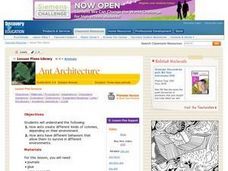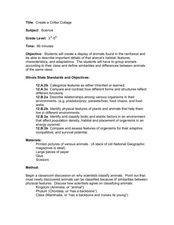Inclusive Technology
Finger Paint With Sounds
Finger painting is fun, but finger painting with sounds is really fun. Finger painting is important for many reasons, it can help children develop a sense of creativity, foster social skills and emotional skills, it helps develop large...
California Academy of Science
Energy: A Day in My Life
If only we could harness the energy of fifth graders, our energy problems would be over! The class discusses where different forms of energy come from and how we use them. They complete a chart of the activities that they do daily that...
Curated OER
The Global Precipitation Measurement Mission (GPM) Lesson
Introduce your class to one of the ways that technology is benefiting humanity. The Global Precipitation Measurement Mission involves the data collected by nine satellites from different countries with a united focus on studying world...
Curated OER
Homelessness
Students explore homelessness. In this speaking, listening, and critical thinking lesson plan, students listen to and discuss 3 scenarios in which families from urban, rural, and suburban communities became homeless due to different...
Curated OER
Naturally Disastrous
Young scholars examine the types and effects of natural disasters. In this natural disaster instructional activity, students study the different types of natural disasters including; avalanches, earthquakes, floods, hurricanes, and...
Curated OER
Nowhere to Run
In this environmental science instructional activity, students explore the different climate change around the world and summarize them. They fill in the table provided.
Curated OER
The Meaning of Genetic Variation
Students investigate variation in the beta globin gene by identifying base changes that do and do not alter function, and by using several Internet-based resources to consider the significance in different environments of the base...
Curated OER
Lesson Three: The History of Christmas Trees, Part Three
Young scholars explore the influence of different beliefs and customs on seasonal celebrations by recognizing their historic development. They develop an awareness that traditions and customs are influenced by different environments.
Curated OER
Match the Machine
Pupils identify simple machines found in different environments. In this matching instructional activity, students match the machine with the place it belongs.
Curated OER
Happy in My Habitat
Fourth graders create animal habitats and explain the biomes they live in. In this habitat lesson, 4th graders recognize the basic needs of animals, characteristics of animals differences and places where they live. Students complete...
Curated OER
Squirrel Islands
In this adaptations worksheet, young scholars read about 3 species that have changed over time to adapt to their environment. Students design a squirrel that has adapted to an island habitat that young scholars are assigned. They...
Curated OER
Ant Arcitecture
Students create pages of a classroom book on the different structures that ants build. They view and discuss a video on ants then, in small groups, research a type of ant shelter. They relate the shelter to the environment in which the...
Curated OER
Create a Critter Collage
Young scholars create a collage. In this animal classification lesson plan, students discuss why and how scientists classify animals. Young scholars view pictures of different animals and decide which class each animal belongs to....
Curated OER
Twins!
Students study genetics and how twins can be identical. In this genetics lesson students research twins and how heredity, environment and personality play a part.
Curated OER
Animals Around Us
Young scholars view and discuss a Discovery Channel video that compares the animals found in four different habitats. They compare and contrast the characteristics of forests, deserts, wetlands and grasslands then choose one to depict...
Curated OER
Evolution
In this evolution instructional activity students complete a crossword puzzle by answering questions about the environment, evolution and populations.
Curated OER
Camp Expedition
Students select an animal to research that lives in the camp environment. Students spend time using books and the Internet to research their animals, including size and appearance. Students create a mural to depict the environment and...
Curated OER
Dig Into Ireland
Students explore environments and wildlife of Ireland to find out how they were formed, and how they helped form Irish culture. Students research online to determine connections between present elements in Irish culture and wildlife and...
Curated OER
Navajo Yei
Students explore geometry in Navajo culture. In this geometry activity, students search for different geometrical shapes in Navajo art. Students then create their own rug or jewelry design using geometrical shapes.
Curated OER
Peppered Moth Simulation
Learners investigate the process of natural selection in peppered moths. In this natural selection lesson plan, students simulate peppered moths in environments similar to those during the industrial revolution. Learners use white paper...
Curated OER
Where are the Dinosaurs?
Students understand what it means when an animal is extinct. In this dinosaur lesson, students create dinosaur dioramas showing their habitat and what in their environment might make them become extinct. students pay particular attention...
Curated OER
Lesson Plans for Sweet Dreams: How Animals Sleep
Students explore the sleeping patterns and sleeping habitats of animals. In this where animals sleep lesson, students research different animal species. Students also write and illustrate an animal picture book, make connections about...
Curated OER
A STEP IN SPECIATION
Students place different subspecies of a CA salamander are placed on grid map of CA according to where samples were collected. Then discuss patterns of their distribution, their likely evolutionary relationships, and probable sequence of...
Curated OER
Adventure Writing: Oregon's Landscape as a Setting
Students identify geographical features of different regions encountered by migrants on the Oregon trail. Students research how the Oregon landscape may have affected life and 19th century westward migration. Students write a narrative...

























